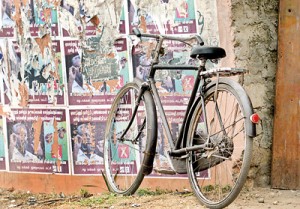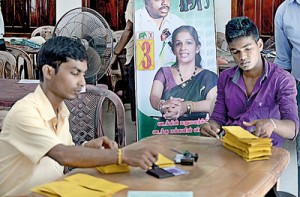News
North awakens to adulthood sans a childhood it never had

President Maithripala Sirisena participated in a pooja at Kailasapillayar kovil in Jaffna on Tuesday
That the mainstream parties are able to cobble together lists of candidates to contest this election shows that, amidst the dark side of postwar North, a more liberal generation with a wider view of the world is coming to the fore.
Dr R. Sivasegaran is one such candidate the Sunday Times interviewed. He has quit as a Medical Officer at the Health Ministry and is contesting for a seat in the National Parliament. (See interview box)
Despite what Dr. Somasunderam refers to as the “collective trauma” where whole communities have been uprooted from familiar and traditional ecological contexts and torn the social fabric, life has been limping back to some normalcy within the peninsula, since the conclusion of the northern insurgency. It’s been five years, the fields are being cultivated, but a shortage of construction workers is slowing down reconstruction efforts. Pockmarked buildings in private blocks are still visible in and around Jaffna, with either the owners having fled the area, or are unable to reconstruct.

Poll’s in the air in Jaffna town: Police are active removing election posters
Ordinary folk such as S. Sivanesan, a teacher in a government school in Jaffna, says, “We will vote for candidates who are willing to speak on behalf of the Tamil people and their causes. They should be able to help people affected by the war and not able to resettle in their respective land. That’s our immediate need. It has to be done.”
Then there is Subramanuim Thangarasa, a 61-year-old businessman who says, “For a long time we have been voting for regional parties, but nothing has been achieved on the sectors of development. Many youth don’t have employment here, because no development has taken place. I will cast my vote for any national party which will develop the north.”
Election fever is not all that visible due to the general clampdown by the Election Commissioner on excesses committed by candidates during the campaign period. When we visited the office of the frontline UNP candidate Vijayakala Maheswaran in downtown Jaffna, she herself had gone for a meeting elsewhere, but we saw young girls busily preparing leaflets for mailing to prospective voters.
 Former minister Douglas Devananda’s posters still remain on city walls, some tattered. One is not certain if they are from an earlier election; but observers believe he would win a seat in the district (See BOX). One of the outlets of the Palmyrah Board which was under him, had empty shelves – just a bottle of palmyrah jam and straw hats. The employees were Devananda appointees and the shutters were up early that afternoon when we returned. Either the employees were campaigning for their former boss, or just went home early because sales were non-existent. An exhibition by the Board, in a large estate on the outskirts of the city, displaying various products from the MPCSs (Multi Purpose Cooperative Societies) in the district, were as empty as the store in the city.
Former minister Douglas Devananda’s posters still remain on city walls, some tattered. One is not certain if they are from an earlier election; but observers believe he would win a seat in the district (See BOX). One of the outlets of the Palmyrah Board which was under him, had empty shelves – just a bottle of palmyrah jam and straw hats. The employees were Devananda appointees and the shutters were up early that afternoon when we returned. Either the employees were campaigning for their former boss, or just went home early because sales were non-existent. An exhibition by the Board, in a large estate on the outskirts of the city, displaying various products from the MPCSs (Multi Purpose Cooperative Societies) in the district, were as empty as the store in the city.
The Tamil National Alliance (TNA) remains the front runner to take the district, but some of its more visible candidates such as M.A. Sumanthiran who is contesting from Velvitithurai, is not generating mass support, mainly due to internecine party rivalry. The Tamil Diaspora is trying to have their say in this election by supporting hardline TNA candidates and ensure moderates like Sumanthiran are defeated.
In a bid ‘to keep the flock loyal to the church’, so to say, the TNA manifesto calls for Federalism, knowing only too well that it’s a bitter pill to swallow in the South. (See BOX). That is why the TNA is following the same policy it adopted at the January 8 Presidential election. They are not aligning themselves with any mainstream party, though it’s an open secret here in Jaffna, that it will throw its lot with the UNFGG (United National Front for Good Governance) should the latter require the numbers to form the next Government.
One of the fallouts from the TNA infighting is the emergence of two new groups directly challenging the TNA, through non-mainstream parties. One is the Crusaders for Democracy, a loose combination of ex-LTTE cadres, some of whom were frontline combatants. They are being led by A. Vidyatharan who was the former editor of the Jaffna-based Uthayan newspaper, and brother-in-law of E. Saranapavan, a TNA MP in the last Parliament, who is also a candidate. Saranapavan is the publisher of the Uthayan.
Uthayan editor, Thevanayagam Premananth had a chat with the Sunday Times at his office. “About 40,000 preferential votes would be the likely cutoff point for a candidate to be elected an MP from the Jaffna District, but that is if polling is very high. This figure could even rise to 50,000. Many candidates will not be able to muster this amount of preferential votes,” he said.
The Tamil Congress (TC), one of the oldest political parties in the North, formed by the late G.G. Ponnambalam, a famous criminal lawyer of his day and later Minister of Industries, is contesting separately. Their campaign is being spearheaded by the late Ponnambalam’s grandson Gajendra Kumar, whose father, the late Kumar Ponnambalam, was also a criminal lawyer and head of the TC. They have chosen to take a hardline posture in the campaign, gambling on the hope that they will garner the support of the radical elements in the district, by outdoing the TNA on the rhetoric.
| Self-Determination- TNA’s catchword The Tamil National Alliance (TNA), in its manifesto, has taken up the position that the Tamil People are entitled to their right to self-determination, in keeping with the United Nations International Covenants on Civil and Political Rights and Economic, Social and Cultural Rights, both of which Sri Lanka has accepted and acceded to. The TNA’s manifesto has spelt out its position regarding a political settlement on the national issue, alleged war crimes and reconciliation among others. Highlights:Power sharing arrangements must continue to be established as it existed earlier in a unit of a merged Northern and Eastern Provinces based on a Federal structure. The Tamil-speaking Muslim historical inhabitants shall be entitled to be beneficiaries of all power-sharing arrangements in the North-East. This will no way inflict any disability on any People.Devolution of power on the basis of shared sovereignty shall be over land, law and order, enforcement of the law so as to ensure the safety and security of the Tamil People, socio-economic development including, inter-alia, health, education, higher and vocational education, agriculture, fisheries, industries, livestock development, cultural affairs, mustering of resources, both domestic and foreign, and fiscal powers. Direct foreign investment in the North-East should be facilitated, resulting in new industries and employment opportunities being created for youth Avenues for tertiary education should also be set-up so that those who cannot enter universities can pursue higher education in relevant fieldsHowever, the TNA has said that the proposals shall be enacted and implemented within the framework of a united and undivided Sri Lanka. | |
EPDP for Provincial self-rule Manifesto Highlights;
| |
Think local, act regional, vote national: The doc turned politico from Jaffna A young UNP candidate vying for a seat in Parliament from the Jaffna district, this week called on voters in the region to break away from tradition and back national political parties.Dr R. Sivasegaran, contesting elections for the first time, told the Sunday Times that voters in the Northern province have to date, been focused on political parties who concentrate in particular regions, instead of supporting mainstream political parties. A young UNP candidate vying for a seat in Parliament from the Jaffna district, this week called on voters in the region to break away from tradition and back national political parties.Dr R. Sivasegaran, contesting elections for the first time, told the Sunday Times that voters in the Northern province have to date, been focused on political parties who concentrate in particular regions, instead of supporting mainstream political parties.“For more than six decades, the people in Jaffna have suffered by supporting regional political parties. It’s now time to come out of that situation,” Dr Sivasangar said.“The voters have not achieved anything. Therefore, they should think twice when casting their votes,” he added. Dr Sivasangar, 34, argued that the youth too could achieve their goals if they engage with mainstream political parties focused on national issues. “It is unfortunate that traditional political parties who focus on regional politics, are seen only during elections, and do not represent the people in their respective areas,” he pointed out. “A representative from a main party will always have the ability to bargain with the government and carry out development work, or provide jobs for those in the area. A smaller regional party cannot achieve this,” he said, adding that, the UNP’s campaign in Jaffna is not focused on party candidates on the list, but on national issues. “There are social problems to be addressed in the North. There is an increase in the drug menace and criminal activities, with resettlement issues also being addressed.” “We need young politicians who can make a decision,” the doctor from Manipay said, and hoped that, at least, a slice of those who voted for the UPFA at the last election, would this time vote for the UNP, as they would be forming the Government in Colombo. | |

